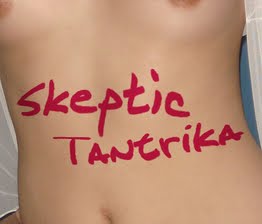While researching kundalini yoga, I came across a lot of criticism from evangelist/fundamentalist christians.
Some have even come up with their own set of yogalike postures, combining them with christian praise music and calling the result "Christoga" or "ChristMoves", neatly allowing for a whole new bunch of DVDs and books.
Not that I'm opposed to making money of course. Stretching + prayer certainly is equally valid as stretching + chanting. As long as it gets people to exercise, that is a good thing.
But what strikes me is that deeply rooted magical mindset, that mystical-mindedness behind all this.
Isn't it somewhat odd for a christian to assume that a yoga pose has a spiritual effect in and of itself? Inside hinduism, this might make sense, since they assume that body and mind are essentially the same. But clearly, the hinduist explanation is invalid from a christian point of view. "Because it comes from a hinduist context, and because the pose is originally meant as an expression of devotion for a hindu deity - therefore practicing it must lead christians astray." - Well... aren't those hindu gods merely figures of stone? How can a physical pose somehow force your mind to succumb to a deity you don't even believe exists?
What they basically say, over and over again, is that the chakras actually DO exist, that the kundalini snake really IS there - only it's not a source of healing energy, but basically a demonic force.
Think of it: This is a practice that was invented by a religion that all those fundamentalist christians deny has any merits. It is a lie. It is simply not true. Inside christianity, there is no such thing as chakras. They're never mentioned in the bible, and St. Augustine of Hippo certainly never pictured them.
And furthermore, there is no objective evidence pointing to the existence of chakras, or the kundalini (or meridians, for that matter). All there is is anectdotal evidence that can easily be explained as autosuggestion.
The same people do the same thing with basically all things mystical. The ouija board, spiritist séances, dowsing rods, aura photography, you name it - it all boils down to one thing: demonic, satanic influence.
But... why assume that practices of another religion, that were invented in a totally different context, that are based on radically different ideas - ideas that those folks clearly deny - have any effect at all? And to be clear, the reason they dislike it is not because it leads people away from christianity (which it probably does, by the way). It is because actual demonic forces cause actual effects in humans - the kundalini snake IS the serpent from the garden of eden in the minds of those folks.
In order to come up with that explanation, you have to assume that the effects of kundalini yoga are real. You have to assume that the effects of, basically, all esoteric practices from all religions and ideologies are real - and you can never let any critical thinking come in your way.
They inadvertently affirm the validity of all religions, really. And of all other ideologies. Of everything that claims to be mystical, ultimately. Only that they then put the label of "demonic" on it and therefore reject it.
Think of it... The question is, how do they ever tell the difference between a mere physical effect, and demonic influence?
For example, if I were to tell one of those preachers that I have developed a practice of regularly fondling my left nipple, and after a while my nipple started to hurt - is that, then, demonic influence? I hope not. What if I told them that after years of that practice, I was able to produce milk from my nipple? What if 100 people were convinced of the same?
What if those 100 people didn't claim that they can produce milk, which is probably too easy to debunk, but that they experienced sudden visions of beautiful colors? Getting closer, folks, aren't we? What if I can produce ancient chinese texts describing the practice? What if those texts mention the names of boddhisattvas and devas?
And suddenly, I have a vision: I see agent Mulder's big poster that he keeps in his basement office and that says in huge letters: "I WANT TO BELIEVE." Because that's what's really going on, isn't it? They want their world to be full of mysteries, of things to be afraid of, and it doesn't matter one bit to those people whether there might be other, less mystical explanations for the same phenomena.
Ironically, those christian fundamentalists are in that regard pretty much the same as their esoteric, new age, buddhist, hinduist, muslim counterparts: gullible to the extreme, afraid of the dark, and deeply mistrustful of anything and anyone that doesn't fit their worldview.
I sit, I breathe, I clench some muscles. Good feelings arise. What exactly are the criteria for deciding whether this is demonic or not?

Good post. Thanks for taking apart the Chakra nonsense. I took yoga for a while...my god i don't believe in westerners will believe anything they read if it comes from someplace "spiritual" like India or Tibet.
ReplyDeleteYeah, there is a lot of weird idolisation going on. I recently read an article that claimed that TCM is really an invention of the 1960s. I don't know that, but I wouldn't be surprised...
DeleteWhat I find odd (and particularly telling) is that christian fundamentalists, along with occultists of all backgrounds, confirm the "spiritual essence" of virtually all "spiritual" teachings. That leads me to think that a) there is a common theme of essentialism running in all of them, and b) once you let go of skepticism in one regard, there is no limit to what b.s. you can believe.